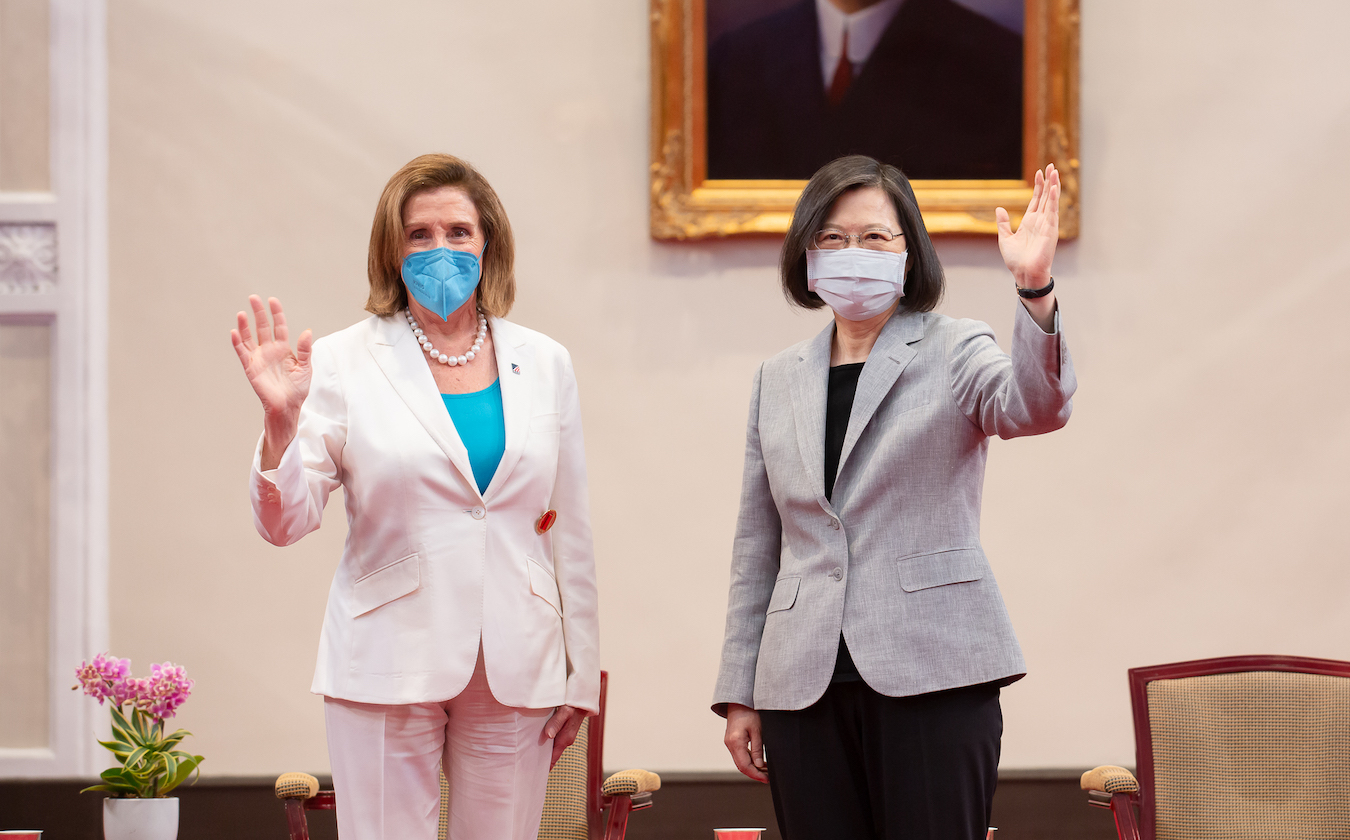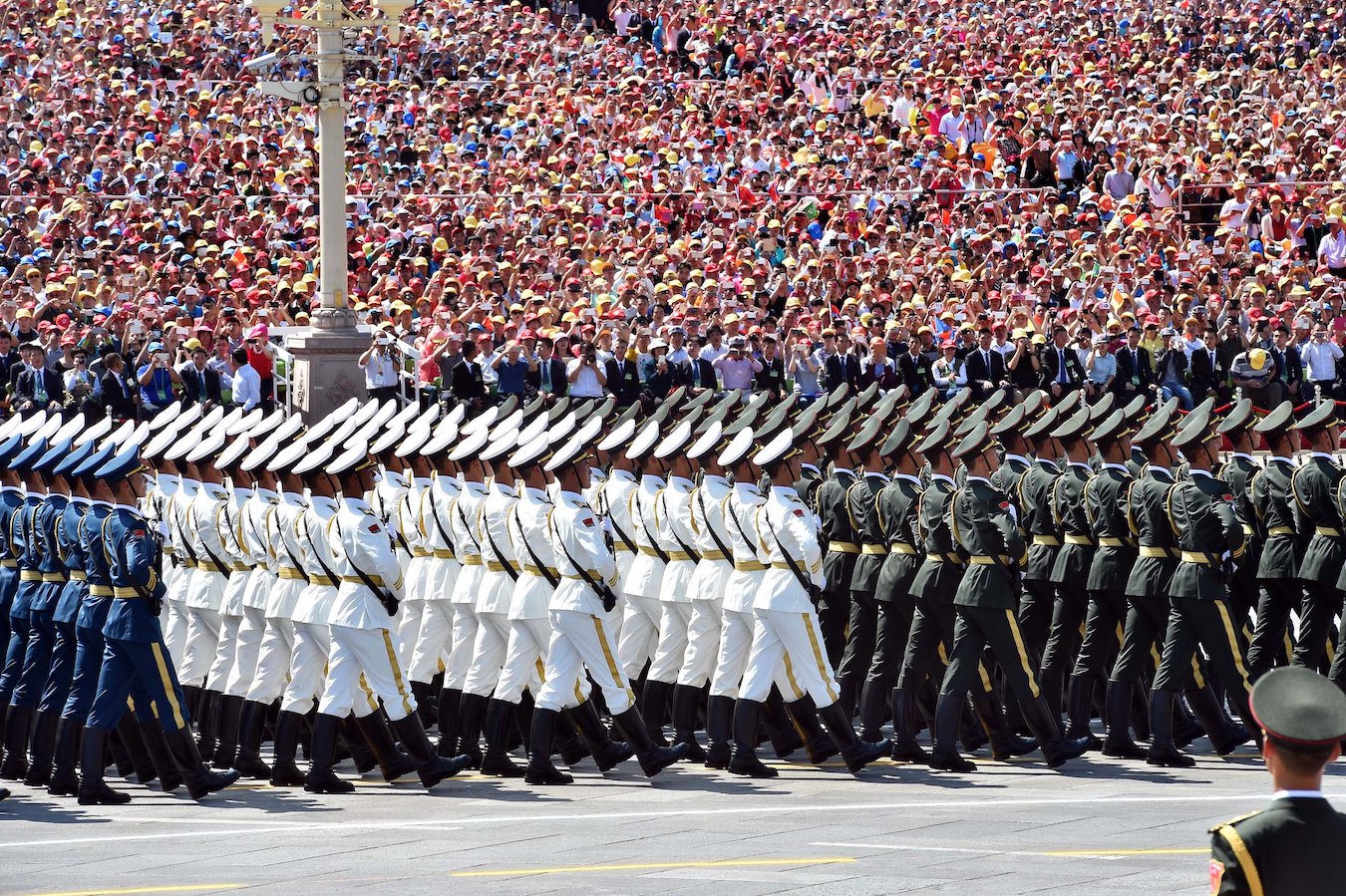by Brian Hioe
語言:
English /// 中文
Photo Credit: Presidential Press and Information Office/WikiCommons/CC BY 4.0
A RECENT PRESS conference held by a number of senior left-wing scholars, calling for an “anti-war” stance for Taiwan, proved an exercise in not only naivete about China but profound US-centrism–that is, a preoccupation with the US and western powers and failure to see the world outside of a Euro-American framework.
The press conference was held by National Chiao Tung Yang Ming University professor Fu Daiwie, National Cheng Chi University professors Guo Li-xin and Feng Jian-san, as well as Academia Sinica researcher Lu Chien-yi, for the establishment of the “Taiwan Anti-War Statement Working Group”. However, the statement had a total of 37 signatories, including many scholars with long histories of participating in social movements. The press conference was held to respond to accusations ahead of time that the participants were acting as a fifth column for China, and framed itself as calling for “No War, No Weapons, Self-Autonomy, and Valuing the Environment.”
In the backdrop of the statement and press conference, was the specter of the war in Ukraine, which broke out last year following Russia’s invasion of Ukraine. Taiwan was framed as potentially becoming a conflict zone in the manner of Ukraine.
 Photo credit: Wang Yu Ching/Presidential Office/Flickr/CC BY 2.0
Photo credit: Wang Yu Ching/Presidential Office/Flickr/CC BY 2.0
Still, what proved remarkable about the press conference was to which the war in Ukraine was attributed purely to the actions of western powers and NATO. The worldview that panelists took framed Russia’s actions as the result of the securitization of eastern Europe, rather than say that….Russia could have simply chosen not to invade its neighbor.
In spite of the panelists claiming to value Taiwanese democracy, when Taiwan has historically always been a geopolitical pawn of larger powers, with little attention ever paid to the views of Taiwanese on their own self-determination–it proves remarkable for Taiwanese to discuss the conflict in Ukraine solely as though this were due to America and the West, without ever considering what the wishes of Ukrainians themselves are–and to generally deflect blame from Ukraine. As such, the conflict was framed as the result of western warmongers, never mind that Russia could have decided not to invade, and Ukrainians do not presently wish for the war to end, in light of Ukraine’s successes pushing back Russia to date–negotiating a premature settlement to the war would simply embolden future aggressions by Russia down the line.
It proves dreadfully ironic for self-proclaimed Taiwanese anti-colonial leftists to disregard Ukrainian voices entirely when Ukraine, like Taiwan, is caught between larger powers and struggles for its self-determination. Instead, Ukraine is only spoken of as the singular fault of the actions of the US empire. The parallels between Ukraine and Taiwan are not simply that Ukraine has historically been used as a geopolitical chess piece, but also extend to Russia’s claims that Ukraine has no history or culture of its own, and that it has always been part of Russia.
But the viewpoints of the academics part of the working group prove profoundly western-centric. While lambasting uncritical western media that they claim hypes of warmongering perspectives, they instead turn to…other western media, except what they claim to be alternative media. However, if the war in Ukraine has revealed anything, it is how insular western leftists are in seeing America as the world’s one and only Big Bad, while failing to understand that other countries can also be imperial aggressors.
Noam Chomsky is a particular point of reference for the members of the working group, seeing as the working group partly came out of a symposium on Chomsky’s life and work. But there proves few western leftists as insular as Chomsky, who has thrown his support time and time again behind authoritarian leftist regimes that he idealizes and romanticizes out of his deep-rooted desire to self-flagellate about the evils of western imperialism, while holding up some utopian ideal to project his wishes and fantasies onto.
Chomsky, too, has shown as of late that he scarcely regards the little people caught between great power struggles as important or worth considering in any way. A recent interview with Chomsky saw him labeling Taiwan a mere “rock”, taking a cue from Thomas Friedman.
The insularity of western leftists who merely seek to self-flagellate about the actions of the west abroad coheres strangely well with how the members of the Anti-War Working Group seem to perceive China as the victim of western aggression, with western insularity and complete absence of knowledge about non-western contexts as Taiwan or China dovetailing neatly with such Taiwanese leftists’ desire to let China off the hook when it comes to its aggression towards its neighbors.
Moreover, it proves ironic for Taiwanese leftists critical of US empire to otherwise focus purely on the viewpoints of US leftists that prove wholly unaware of the world outside of the US–such leftists sharing with the US right, a sense of American exceptionalism if nothing else–and scarcely consider the views of leftists from other small countries caught between the US and China. Yet this has long been the pattern with the academic left in Taiwan, seeing as they were mostly western educated, and criticize the US empire using theory itself mechanistically, mimetically, and reproductively imported from the West. So, too, now with US anti-war discourse, some of which has now turned toward claiming that China has abolished all poverty within its borders.
During the conference, members of the Anti-War Working Group point to the much higher number of US bases internationally to suggest that China is a “paper tiger” and that the threat it seems to pose is inflated by the US. But certainly, while the US and China are far from equals, why does this mean that China does not pose a threat?
At the end of the Cold War, it became clear that the US and the “Communist camp” of Soviet Union and China were never equals at all, but that the US always had a stronger military and economy–yet this did not prevent conflict between the two rival camps of superpowers between capitalist and nominally communist nations from devastating nations ranging from Afghanistan to Vietnam and Cambodia. Even if China does not have military parity with the US, this does not mean that Taiwan could not stand to be caught in conflict between the two.
And was it not a mere six months ago that China simulated a blockade of Taiwan in response to the Pelosi visit? It is a shallow view to think that military exercises that took place closer to Taiwan than during the Third Taiwan Straits Crisis were somehow a reciprocal response to a visit by a US politician, when it is not as though the US responded to Chen Yunlin’s visit to Taiwan in 2008 with a threat of force directed at the Ma administration–as late as 2012, the US preferred that Ma stay in power, and sought to sabotage Tsai’s 2012 run with a phone call placed to the Financial Times from the White House.
The members of the working group seem to labor under bizarre perceptions, too, of the US’s strategic interest in Taiwan–believing that the US’s main interest in Taiwan is to sell arms to Taiwan and make money for arms manufacturers. Certainly, one would have to be completely foolhardy to believe that the US has Taiwan’s interests in mind, but the US’s use for Taiwan is more for other ends, such as reliance on Taiwanese semiconductors, or because Taiwan would prove a valuable geostrategic location for China to expand its power into the Asia Pacific.
 Photo credit: GovernmentZA/Flickr/CC BY-ND 2.0
Photo credit: GovernmentZA/Flickr/CC BY-ND 2.0
Yet so it is, then, that in recent times, one has seen bizarre proposals from Taiwanese leftists of the pro-unification stripe such as Coolloud editor Wang Hao-zhong–who apparently has no interest in hiding his explicitly pro-unification views these days–calling for Taiwan to renounce war and aspire to neutrality. In this, Wang echoes Annette Lu, newly relevant after a bizarre New York Times article touting Lu’s ideas from an author who only ever spent a few days in Taiwan and chose to disregard Lu’s irrelevance to contemporary Taiwanese politics.
Of course, in what world would Taiwan renouncing war would not lead China to step up its aggression against Taiwan, with the view that China can now claim Taiwan unopposed? China’s desire for Taiwan is driven not only by nationalism, but also with the desire that Taiwan will serve as a stepping stone to expanding geopolitical power in the region. But in this proposal, as well as in the views of the Anti-War Working Group, one sees the shared underlying worldview of Taiwan as the only active mover, while China apparently is only ever reactive in responding to Taiwan. From pro-unification leftists as Ka Wei-bo one even sees bizarrely conspiratorial views echoing the KMT that the pro-independence camp hopes for war to realize its ambition of Taiwanese independence.
All this goes to show the irrelevance of a generation of activists that once accomplished great things, but are now moribund–whether this be Chomsky, Annette Lu, or the members of the Anti-War Working Group. Perhaps best to shuffle them and their ideas off the stage of world history and into history’s dustbin as quickly as possible. As Marx said in the 18th Brumaire, “The tradition of all the dead generations weighs like a nightmare on the brain of the living.” Some generations, it seems, prematurely expire.

